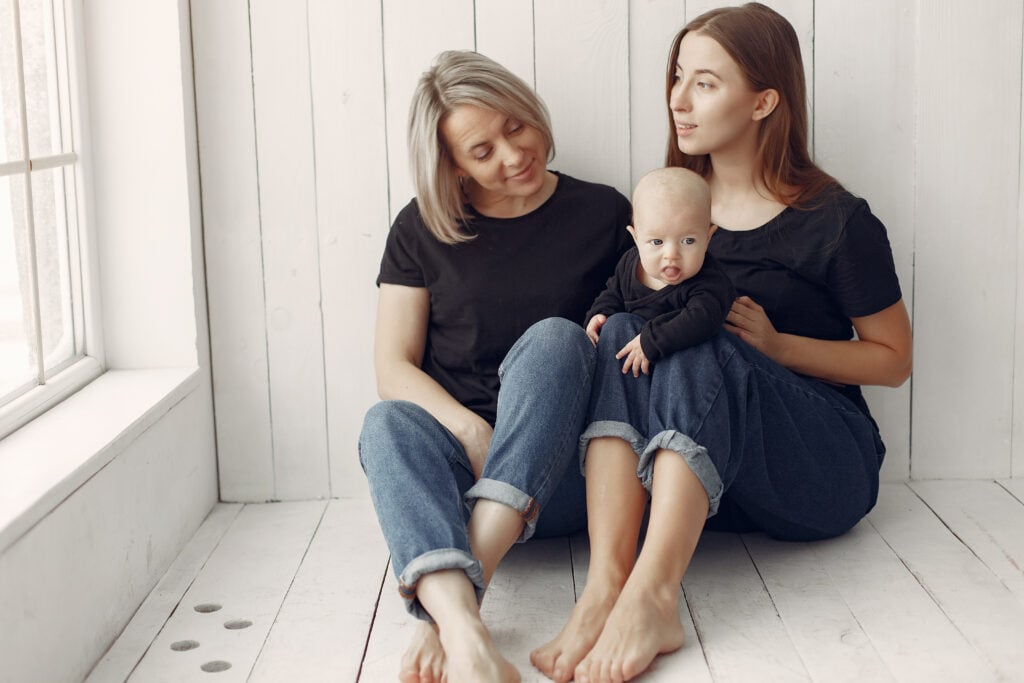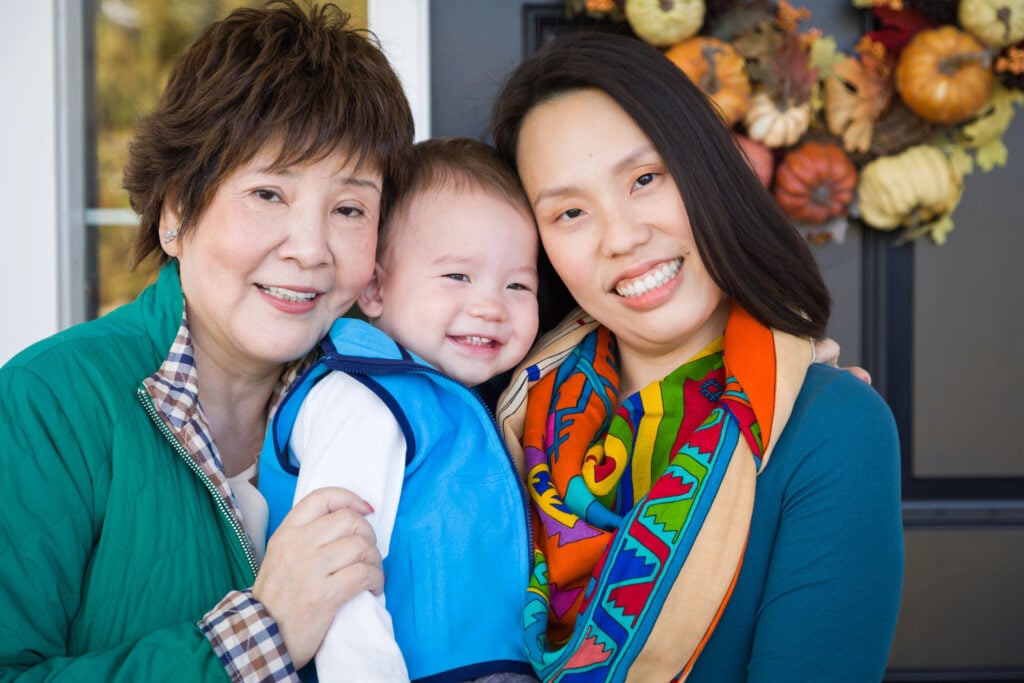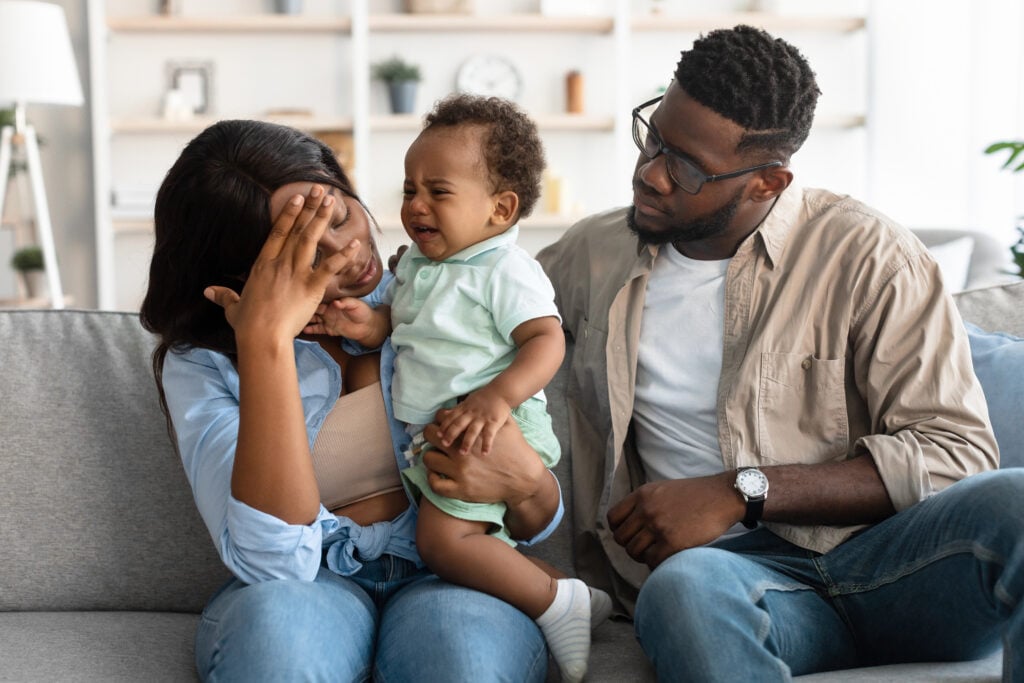
This morning, my five-year-old said something that was pretty hard to understand. I figured it out, but then I immediately sent the video to my mom to see if she’d work it out too.
For one mom in three, that little contact isn’t available, though, and they’re suffering more for it than society really acknowledges. These moms are raising babies without the support of their own mothers, and while they may be knocking it out of the park, there’s an absence there that can really hurt.
Add this to an overall lack of social support, and it’s no wonder moms are struggling.
The Postpartum Support Gap And A Mom-Shaped Missing Piece

There’s a terrible lack of any real support for moms in the postpartum period, and it’s well-known yet somehow still barely addressed. In 2015, a publication in the Journal of Perinatal Education warned:
“[T]he World Health Organization (WHO, 2008) has reported that the postpartum and postnatal period receives less attention from health-care professionals than the prenatal period and childbirth period. In 2009, 11.9% of women in a 29-state area reported postpartum depressive symptoms (U.S. Department of Health and Human Services, 2012); however, postpartum depression frequently goes undiagnosed and untreated because of a lack of knowledge among women and their health-care providers”
Flashback to that time I whispered in a waiting room that I wanted an evaluation for PPD, and the person on the other side of the desk shouted back, “You think you have an infection?” leaving me to explain to a health department receptionist that I was worried about post-partum depression.
At the time, I was living 8 hours from my mom; it was long-distance to call her on my landline, and I didn’t really know anyone in the area I lived in, other than my newborn’s father and some of his family. I was alone, I had a baby, and I was terrified.
I was very alone, but I know now that I was in good company: a study published in 2020 in Health Psychology Open found that up to 80% of women report some postpartum distress, and that new moms particularly desire the support of other moms who have shared experiences and can empathize. Furthermore, moms who don’t have family living nearby are more likely to struggle to find those support resources or even ask for them.
Why Does That Matter?
Okay, it’s 2025. Unlike my situation all those years ago, when I couldn’t reach my mom without incurring a long-distance phone bill, pretty much everyone now has a cell phone and access to social media.
Today, when I wanted my mom’s input, I received it with a few clicks on my phone. Last year, when my child was sick, a community of other moms with whom to compare symptoms and get support in a decision about whether to go to the emergency room was as close as Facebook.
Still, many of us are lacking meaningful connections with other moms, and lacking our own in one of several ways. Many of us have lost our mothers, or have mothers who are not part of our support system, whether it’s due to health conditions, physical distance, or emotional detachment.
Motherly reports that experts say in the postpartum period, a new mother’s own mother “often provides both instrumental support like meals, childcare, and help with household tasks, and emotional scaffolding, such as reassurance and modeling of the caregiver role.”
Lacking that special type of support can leave new moms grieving and add to physical recovery difficulties.
Nurturing While Unnurtured

The postpartum period can be one of the most beautiful times in a new mother’s life, as she bonds with her newborn and basks in the closeness.
It can also be one of the hardest. The body is trying to heal physically, and the mom is exhausted from labor and delivery. Still, now her body is being used as a source of sustenance, and she’s awake every few hours for feeding, so she’s not exactly catching up on lost rest.
If she also has to put down her little one to take care of needs like housekeeping and cooking, that’s even more disruption to what should ideally be a time of healing, resting, and bonding. The Bump reports that one in five new moms has no support or help during this time, other than her partner. More than half of new moms say they’re afraid to ask for the help they need, and nearly half of those who do speak the support they receive isn’t sufficient.
Beyond The Postpartum Stage
Grandmothers, especially maternal grandmothers, are also crucial for childhood development, and for maternal mental health beyond the postpartum stage.
A 2010 study published in the Journal of Family Psychology found that a grandmother’s involvement formed a “protective buffer” that helped improve children’s social behavior and emotional well-being. The study also found a lower incidence of harsh parenting from the child’s mother when her own mother was actively involved in the family’s life.
As moms, many of us are struggling with insufficient or incomplete social support networks. Still, more and more evidence suggests that our own mothers are a key part of that network, and that even building our own support networks doesn’t entirely make up for that missing piece.

